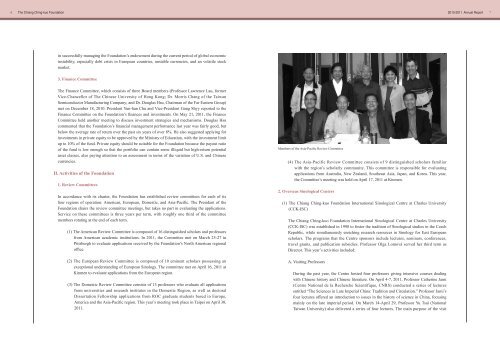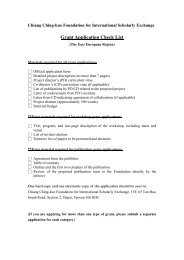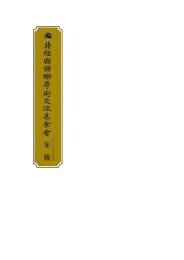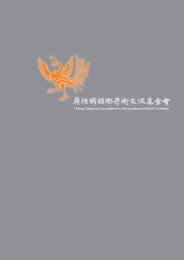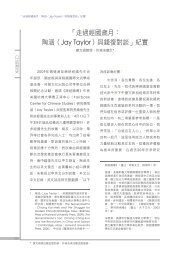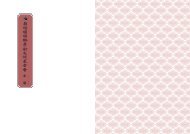Chiang Ching-kuo Foundation for International Scholarly Exchange
Chiang Ching-kuo Foundation for International Scholarly Exchange
Chiang Ching-kuo Foundation for International Scholarly Exchange
Create successful ePaper yourself
Turn your PDF publications into a flip-book with our unique Google optimized e-Paper software.
6 The <strong>Chiang</strong> <strong>Ching</strong>-<strong>kuo</strong> <strong>Foundation</strong> 2010-2011 Annual Report 7<br />
in successfully managing the <strong>Foundation</strong>’s endowment during the current period of global economic<br />
instability, especially debt crisis in European countries, unstable currencies, and an volatile stock<br />
market.<br />
3. Finance Committee<br />
The Finance Committee, which consists of three Board members (Professor Lawrence Lau, <strong>for</strong>mer<br />
Vice-Chancellor of The Chinese University of Hong Kong; Dr. Morris Chang of the Taiwan<br />
Semiconductor Manufacturing Company; and Dr. Douglas Hsu, Chairman of the Far Eastern Group)<br />
met on December 18, 2010. President Yun-han Chu and Vice-President Gang Shyy reported to the<br />
Finance Committee on the <strong>Foundation</strong>’s finances and investments. On May 21, 2011, the Finance<br />
Committee held another meeting to discuss investment strategies and mechanisms. Douglas Hsu<br />
commented that the <strong>Foundation</strong>’s financial management per<strong>for</strong>mance last year was fairly good, but<br />
below the average rate of return over the past six years of over 8%. He also suggested applying <strong>for</strong><br />
investments in private equity to be approved by the Ministry of Education, with the investment limit<br />
up to 10% of the fund. Private equity should be suitable <strong>for</strong> the <strong>Foundation</strong> because the payout ratio<br />
of the fund is low enough so that the portfolio can contain some illiquid but high-return potential<br />
asset classes, also paying attention to an assessment in terms of the variation of U.S. and Chinese<br />
currencies.<br />
II. Activities of the <strong>Foundation</strong><br />
1. Review Committees<br />
In accordance with its charter, the <strong>Foundation</strong> has established review committees <strong>for</strong> each of its<br />
four regions of operation: American, European, Domestic, and Asia-Pacific. The President of the<br />
<strong>Foundation</strong> chairs the review committee meetings, but takes no part in evaluating the applications.<br />
Service on these committees is three years per term, with roughly one third of the committee<br />
members rotating at the end of each term.<br />
(1) The American Review Committee is composed of 16 distinguished scholars and professors<br />
from American academic institutions. In 2011, the Committee met on March 25-27 in<br />
Pittsburgh to evaluate applications received by the <strong>Foundation</strong>’s North American regional<br />
office.<br />
(2) The European Review Committee is composed of 10 eminent scholars possessing an<br />
exceptional understanding of European Sinology. The committee met on April 16, 2011 at<br />
Kinmen to evaluate applications from the European region.<br />
(3) The Domestic Review Committee consists of 13 professors who evaluate all applications<br />
from universities and research institutes in the Domestic Region, as well as doctoral<br />
Dissertation Fellowship applications from ROC graduate students based in Europe,<br />
America and the Asia-Pacific region. This year’s meeting took place in Taipei on April 30,<br />
2011.<br />
Members of the Asia-Pacific Review Committee<br />
(4) The Asia-Pacific Review Committee consists of 9 distinguished scholars familiar<br />
with the region’s scholarly community. This committee is responsible <strong>for</strong> evaluating<br />
applications from Australia, New Zealand, Southeast Asia, Japan, and Korea. This year,<br />
the Committee’s meeting was held on April 17, 2011 at Kinmen.<br />
2. Overseas Sinological Centers<br />
(1) The <strong>Chiang</strong> <strong>Ching</strong>-<strong>kuo</strong> <strong>Foundation</strong> <strong>International</strong> Sinological Centre at Charles University<br />
(CCK-ISC)<br />
The <strong>Chiang</strong> <strong>Ching</strong>-<strong>kuo</strong> <strong>Foundation</strong> <strong>International</strong> Sinological Centre at Charles University<br />
(CCK-ISC) was established in 1998 to foster the tradition of Sinological studies in the Czech<br />
Republic, while simultaneously enriching research resources in Sinology <strong>for</strong> East European<br />
scholars. The programs that the Centre sponsors include lectures, seminars, conferences,<br />
travel grants, and publication subsidies. Professor Olga Lomová served her third term as<br />
Director. This year’s activities included:<br />
A. Visiting Professors<br />
During the past year, the Centre hosted four professors giving intensive courses dealing<br />
with Chinese history and Chinese literature. On April 4-7, 2011, Professor Catherine Jami<br />
(Centre National de la Recherche Scientifique, CNRS) conducted a series of lectures<br />
entitled “The Sciences in Late Imperial China: Tradition and Circulation.” Professor Jami’s<br />
four lectures offered an introduction to issues in the history of science in China, focusing<br />
mainly on the late imperial period. On March 14-April 29, Professor Yu Tsai (National<br />
Taiwan University) also delivered a series of four lectures. The main purpose of the visit


